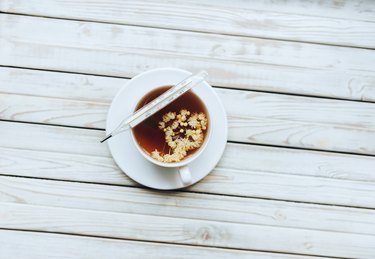
Linden flower tea has long been used as a natural sleep aid. Some say that it also relieves stress and anxiety, fights inflammation and soothes the stomach. This herbal tea isn't a cure-all, but it may benefit overall health when consumed in moderation.
What Is Linden Flower Tea?
Video of the Day
Everyone knows that herbal teas may benefit overall health and relieve the symptoms associated with certain conditions. Rich in bioactive compounds, these beverages possess antimicrobial, anti-inflammatory and anti-cancer properties. They are a good source of flavonoids, carotenoids, polyphenols and other antioxidants, according to a review published in the Journal of Traditional and Complementary Medicine in October 2018. Linden flower tea is no exception.
Video of the Day
This healthful beverage is made from the flowers of the linden (lime) tree, which belongs to the Tilia genus. It's packed with amino acids, volatile oils, saponins, tannins and flavonoids, such as quercetin and kaempferol, reports the European Medicines Agency. The tea is traditionally used as a natural remedy for common colds, dry cough, indigestion, vomiting, high blood pressure and other ailments.
Read more: 6 Surprising Ways to Cook With Tea
As the European Medicines Agency notes, linden flower tea appears to be particularly effective for panic disorders, insomnia and mental stress due to its sedative effects. The research is limited, though. Although this beverage may help with the common cold, its other uses require further investigation. Most studies have been conducted on mice or in vitro (a controlled lab environment), so it's hard to tell how their findings translate to humans.
For example, a July 2017 in-vitro study featured in PeerJ assessed the antimicrobial effects of 31 herbal teas. Only 15 samples have been proven effective against one or more microorganisms. Linden flower tea did not show any activity.
Are There Any Benefits?
Most claims surrounding this beverage are based on anecdotal evidence. According to Penn State Hershey, linden flower tea contains bioactive compounds that promote sweating and hence may help reduce fever. Animal studies and in-vitro tests confirm its sedative, diuretic and antispasmodic effects. However, these findings don't necessarily apply to human subjects.
A research paper published in the journal Antioxidants in August 2019 compared the nutritional value of several edible flowers, including linden blossom, daisy, elderberry, primrose and others. Linden blossom was the lowest in phenolic acids and flavonols, two types of antioxidants that scavenge free radicals, improve glucose metabolism and support cardiovascular health, among other potential benefits.
Unlike other edible flowers, linden blossom contains no anthocyanins. However, it does provide significant amounts of flavan 3-ols, procyanidins, carotenoids and triterpenoids. Flavan 3-ols, for example, are a class of polyphenols that may improve insulin sensitivity and reduce blood pressure, although more research is needed to confirm these findings.
According to the Antioxidants review, linden blossom may help lower blood sugar and slow aging. These beneficial effects are largely due to its antioxidant content.
Surprisingly, linden flower tea also contains caffeine, despite being promoted as a natural sleep aid. However, one cup has no more than 226 micrograms of caffeine (0.226 milligrams), so it's unlikely to affect your sleep. Brewed green tea, by comparison, provides 25 to 29 milligrams of this compound per cup.
Linden Flower Tea Side Effects
Like most herbal remedies, linden tea may carry potential side effects. Although it's generally safe, it should be used with caution in people with low blood pressure due to its hypotensive effects. Additionally, it may increase the potency of sedative drugs and reduce the efficacy of medications used to raise blood pressure, warns the University of Texas at El Paso.
According to the same source, linden tea should not be used along with other herbs that may lower blood pressure. Drowsiness, hives and allergic reactions may occur as well. In rare cases, this beverage may cause damage to the heart muscle when consumed in large amounts or for long periods of time.
Read more: The Side Effects of Sleepytime Tea
As mentioned earlier, linden flower tea may have diuretic effects, so it helps flush out water from your system. Therefore, it may benefit those struggling with fluid retention. The downside is that it can interact with diuretics and cause dehydration.
Furthermore, it may increase lithium levels in the bloodstream, point out the experts at Penn State Hershey. If you take lithium, ask your healthcare provider whether it's safe to drink linden tea. Pregnant or breastfeeding women and individuals with heart disease should get a doctor's approval, too.
Stay on the safe side and stick to the recommended daily dose. According to the European Medicines Agency, adults and teenagers with common colds should not exceed four cups of linden flower tea per day. Use 1.5 grams (0.05 ounces) of herb per 150 milliliters (5 fluid ounces) of boiling water to reap the benefits.
- Journal of Traditional and Complementary Medicine: "Herbal Beverages: Bioactive Compounds and Their Role in Disease Risk Reduction - A Review"
- European Medicines Agency: "Assessment Report on Tilia Cordata Miller, Tilia Platyphyllos Scop., Tilia X Vulgaris Heyne or Their Mixtures"
- PeerJ: "Antimicrobial Activities of Widely Consumed Herbal Teas, Alone or in Combination With Antibiotics: An in Vitro Study"
- Penn State Hershey: "Linden"
- Antioxidants: "Anti-Hyperglycemic and Anticholinergic Effects of Natural Antioxidant Contents in Edible Flowers"
- Advances in Pharmacological and Pharmaceutical Sciences: "Therapeutic Potential of Dietary Phenolic Acids"
- NCBI: "Flavan 3-ols Improve Metabolic Syndrome Risk Factors: Evidence and Mechanisms"
- Chimia: "Unexpected Occurrence of Caffeine in Sleep-Inducing Herbal Teas"
- Mayo Clinic: "Caffeine Content for Coffee, Tea, Soda and More"
- University of Texas at El Paso: "Linden Tree"
Is this an emergency? If you are experiencing serious medical symptoms, please see the National Library of Medicine’s list of signs you need emergency medical attention or call 911.